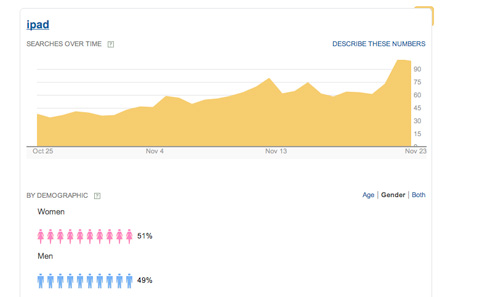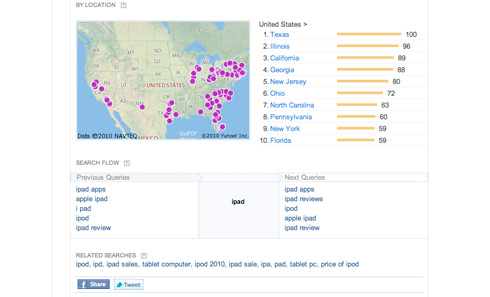It might just be personal curiosity or a necessary part of a business venture, but at one time or another we’ve all wondered who is searching for what terms and when they are doing it. Most search engines have this information, and now Yahoo! is showing what we look for online by revealing the data in their latest project, Yahoo! Clues.
“We think over the last 12 years search has been pretty static and fits a particular set of users needs,” says Yahoo!’s SVP of Search and Marketplaces Shashi Seth. “Now, we can provide them answers not links.”
(More on TIME.com: Yahoo to Revamp Mail, Search, Make iPad App, Integrate Twitter)
When you put in a search term, the new function won’t give you websites you should look at. Instead, it will break down the demographics of who typically searches for that term, what their income looks like, where people interested in this subject live, and what other terms they search for related to the first word. The data is aggregated from Yahoo! users, most of whom remain logged in while they’re using the search engine. The project emerged out of one Yahoo!’s research labs in Spain that was doing analysis on web search results.
(More on TIME.com: Bing Gets Facebook Integration: Be Careful What You ‘Like’)
Yahoo! Clues seems it would be most beneficial to companies concerned with search engine optimization or SEO. Just plug in a word of interest like iPad, and you can find out whether more men or women are interested in the product. (It tends to be quite even, with women slightly edging out the men 51 percent to 49 percent.) You’ll also get a chart of how many people searched the term over a period of time. iPad seems to be peaking today, perhaps due to Black Friday being just around the corner. Click around on the other functions and you’ll find that men and women 35 to 44 are the most interested in the iPad, they tend to make around $25K to $50K and for some reason, most of the searches are coming out of Texas, Illinois and California. This information could be especially valuable for websites who are trying to target their traffic and want to know what people are interested in looking for.
(More on TIME.com: Google Eyes Yelp with ‘Hotpot’ Personalized Recommendations)
Director of Search Products at Yahoo! Brian Theodore insists it’s not just for companies. “They are more clinical oriented tools which is more interesting to the wider demographic,” Theodore said. For example, Yahoo! thinks the “search flow” function will appeal more to their average user. This item shows what previous words people searched for before deciding to look for the word you put in Yahoo! Clues. For example, with iPad, people typically try to find “iPad apps” before and after they decide to search for just “iPad.” Yahoo! is hoping that users who see these other options will go ahead and try looking for those other words as well, increasing the amount of searching they do on the site. On some searches on the main Yahoo! page they’re also including one or two factoids from Yahoo!Clues to try and draw more people to see the new project.
(More on TIME.com: Google Looking To Buy Groupon?)
“Whenever you go to Yahoo! search, wouldn’t you want to know just one factoid about one keyword?” Seth said. “This gives you an incentive to get more information. Clues’ data give more value to our users and drives more traffic. It has lots of interest to various people who want to know how are you doing this, why are you doing this? That’s exactly what we want to know too.”
(More on TIME.com: Google: The Grinch Who’s Trying To Steal Your Facebook Data)
Yahoo! Clues is currently in beta stage, with no set date when the site will be at its full functionality. Theodore added they will be adding more terms and updating the program as they go along, so users should keep checking in for new functions. The company has no plans as of now to monetize the operation, perhaps providing some of this information for free and additional more detailed analytics behind a paywall for interested parties, but it is always an option. Right now, with only limited promotion, they claim they’ve been getting a lot of buzz and are very happy with the product and just focusing on the current moment.
“When you start drilling down into the information it’s pretty eye-opening,” Seth said. “You assume other things, and when the facts are presented it shows you something completely different.”



